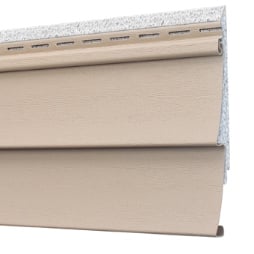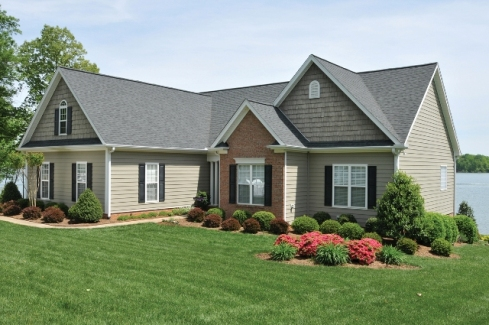Every year the New England region of the northeast United States receives as many as 35 to 55 inches of precipitation. New England is also notorious for periods of intense snowfall. Compared to other regions of the U.S., New England homeowners must choose a home siding that can accommodate these wide swings in seasonal weather patterns.
Specifically, the region's freeze and thaw cycle poses a unique problem for homeowners interested in the best siding available today. Home siding in New England must be well insulated to properly guard against frigid winter conditions while still being moisture-resistant enough to prevent damage to the home's interior structure, too. The traditional choices of moisture-resistent siding material include vinyl, wood, and metallic composites; but unlike Everlast composite siding, these three old siding materials fall short of achieving optimal results.
Vinyl siding was a popular choice among home builders who tried to appeal to economical homeowners in the 1990s. Today, vinyl siding is an inferior moisture-resistant siding for aesthetic and practical reasons. Vinyl siding is very thin is and usually double-overlapped at its seams, which can appear unsightly if moisture causes the siding to expand and contract. Vinyl (read: plastic) can also chip and crack after years of punishment from snow, ice, and rain.
Metal siding is equally as inferior as vinyl siding. During the mid-20th century, home builders considered metal siding a technological breakthrough because the material was so versatile. The problem with metal siding revolves around the material inevitably degrading over time in climates with varied weather patterns.
Hailstorms and heavy rainfalls can actually dent the siding rather easily, not to mention ruin the protective paint coating which turns chalky-colored over time. Weather damage can compromise the moisture-resistant benefits of all metal sidings, aluminum, or steel. Metal siding is also by far the noisiest siding material still used today, which many homeowners find intolerable.
Wood siding is increasing in popularity among homeowners searching for a  natural, "green" aesthetic. Unfortunately, New Englanders should reconsider installing wood siding because it is a poor weather insulator. Moisture-resistent siding materials ideally should not absorb any moisture at all, but wood siding by its very nature absorbs water, which may provide a ripe environment for mold and fungi to grow. Wood siding has its aesthetic benefits, however, but the material must be properly maintained to prevent rotting over time.
natural, "green" aesthetic. Unfortunately, New Englanders should reconsider installing wood siding because it is a poor weather insulator. Moisture-resistent siding materials ideally should not absorb any moisture at all, but wood siding by its very nature absorbs water, which may provide a ripe environment for mold and fungi to grow. Wood siding has its aesthetic benefits, however, but the material must be properly maintained to prevent rotting over time.
Everlast composite siding trumps all three of the traditional home sidings discussed above, both in terms of aesthetics and practicality. The thick, moisture-resistant composite consists of inorganic minerals and rigid polymeric resins. Thus, this siding combines all of the best qualities of the old siding materials without the risk of moisture infiltration. Durability and longevity are the two biggest strengths of Everlast composite siding, so homeowners who endure New England weather would do well to strongly consider this new material when shopping for home siding.






